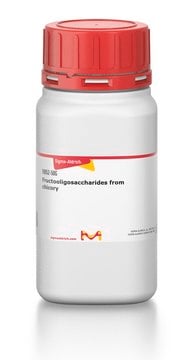47740
D-(−)-Fructose
≥99.0% (HPLC), suitable for microbiology
Synonym(s):
D-Levulose, Fruit sugar
About This Item
Recommended Products
Quality Level
Assay
≥99.0% (HPLC)
form
powder
optical activity
[α]20/D −92±2°, 1 hr, c = 10% in H2O
ign. residue
≤0.1% (as SO4)
loss
≤0.1% loss on drying, 20 °C (HV)
mp
119-122 °C (dec.) (lit.)
solubility
H2O: 0.1 g/mL, clear, colorless
anion traces
chloride (Cl-): ≤50 mg/kg
sulfate (SO42-): ≤50 mg/kg
cation traces
As: ≤0.1 mg/kg
Ca: ≤10 mg/kg
Cd: ≤5 mg/kg
Co: ≤5 mg/kg
Cr: ≤5 mg/kg
Cu: ≤5 mg/kg
Fe: ≤5 mg/kg
K: ≤50 mg/kg
Mg: ≤5 mg/kg
Mn: ≤5 mg/kg
Na: ≤50 mg/kg
Ni: ≤5 mg/kg
Pb: ≤5 mg/kg
Zn: ≤5 mg/kg
application(s)
microbiology
SMILES string
OC[C@@H](O)[C@@H](O)[C@H](O)C(=O)CO
InChI
1S/C6H12O6/c7-1-3(9)5(11)6(12)4(10)2-8/h3,5-9,11-12H,1-2H2/t3-,5-,6-/m1/s1
InChI key
BJHIKXHVCXFQLS-UYFOZJQFSA-N
Looking for similar products? Visit Product Comparison Guide
General description
Biochem/physiol Actions
Storage Class Code
11 - Combustible Solids
WGK
WGK 1
Flash Point(F)
Not applicable
Flash Point(C)
Not applicable
Personal Protective Equipment
Regulatory Listings
Regulatory Listings are mainly provided for chemical products. Only limited information can be provided here for non-chemical products. No entry means none of the components are listed. It is the user’s obligation to ensure the safe and legal use of the product.
JAN Code
47740-VAR-F:
47740-BULK-F:
47740-250G-F:
47740-1KG-F:
Choose from one of the most recent versions:
Certificates of Analysis (COA)
Don't see the Right Version?
If you require a particular version, you can look up a specific certificate by the Lot or Batch number.
Already Own This Product?
Find documentation for the products that you have recently purchased in the Document Library.
Customers Also Viewed
Articles
Culture media provides a habitat with suitable nutrients, energy sources, and certain environmental conditions for the growth of microorganisms. The components of the culture media range from simple sugars to peptones, salts, antibiotics, and complex indicators.
Our team of scientists has experience in all areas of research including Life Science, Material Science, Chemical Synthesis, Chromatography, Analytical and many others.
Contact Technical Service





